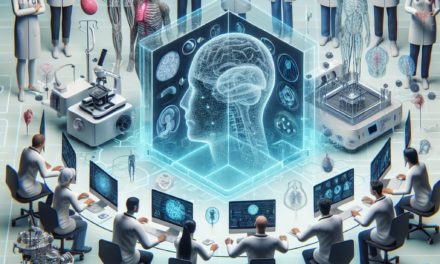Enhancing Healthcare IT: The Role of AIOps
The healthcare industry is undergoing a significant transformation, driven by technological advancements and the increasing demand for efficient, patient-centered care. One of the most promising developments in this realm is the integration of Artificial Intelligence for IT Operations (AIOps). AIOps leverages machine learning and data analytics to enhance IT operations, streamline processes, and improve patient outcomes. This article explores the multifaceted role of AIOps in healthcare IT, examining its benefits, challenges, and future potential.
1. Understanding AIOps in Healthcare
AIOps refers to the application of artificial intelligence to IT operations, enabling organizations to manage their IT infrastructure more effectively. In healthcare, AIOps can analyze vast amounts of data from various sources, including electronic health records (EHRs), medical devices, and patient management systems. This capability allows healthcare providers to identify patterns, predict issues, and automate responses, ultimately enhancing operational efficiency.
Healthcare organizations generate enormous volumes of data daily. According to a report by the International Data Corporation (IDC), the global healthcare data sphere is expected to reach 2,314 exabytes by 2020, with a significant portion of this data being unstructured. AIOps can help healthcare IT teams sift through this data, providing actionable insights that can lead to improved patient care and operational efficiency.
Key components of AIOps in healthcare include:
- Data Integration: AIOps tools can integrate data from disparate sources, providing a unified view of operations.
- Real-time Analytics: AIOps enables real-time monitoring and analysis of IT systems, allowing for proactive issue resolution.
- Automation: Routine tasks can be automated, freeing up IT staff to focus on more strategic initiatives.
- Predictive Analytics: AIOps can predict potential system failures or performance issues before they occur.
- Enhanced Security: AIOps can identify security threats in real-time, helping to protect sensitive patient data.
2. Benefits of AIOps in Healthcare IT
The implementation of AIOps in healthcare IT offers numerous benefits that can significantly enhance operational efficiency and patient care. Here are some of the most notable advantages:
2.1 Improved Operational Efficiency
One of the primary benefits of AIOps is its ability to improve operational efficiency. By automating routine IT tasks, healthcare organizations can reduce the burden on their IT staff. For instance, AIOps can automate system monitoring, alerting IT teams only when critical issues arise. This allows IT professionals to focus on more complex problems that require human intervention.
Case Study: A large hospital network implemented an AIOps solution that automated its incident management process. As a result, the hospital reduced its incident response time by 40%, allowing IT staff to allocate more time to strategic projects that enhance patient care.
2.2 Enhanced Patient Care
AIOps can also lead to improved patient care by ensuring that healthcare IT systems are always operational. Downtime in IT systems can lead to delays in patient care, which can have serious consequences. By predicting and preventing system failures, AIOps helps ensure that healthcare providers can deliver timely and effective care.
For example, a healthcare provider using AIOps was able to predict a potential failure in its EHR system based on historical data patterns. By addressing the issue proactively, the organization avoided a system outage that could have delayed patient treatments.
2.3 Cost Reduction
Implementing AIOps can lead to significant cost savings for healthcare organizations. By automating processes and improving operational efficiency, organizations can reduce labor costs and minimize the risk of costly downtime. Additionally, predictive analytics can help organizations avoid expensive system failures by addressing issues before they escalate.
According to a study by Gartner, organizations that implement AIOps can reduce IT operational costs by up to 30%. This reduction can be particularly beneficial for healthcare organizations, which often operate on tight budgets.
2.4 Enhanced Security and Compliance
Data security is a critical concern in healthcare, where sensitive patient information is at risk. AIOps can enhance security by providing real-time monitoring of IT systems, identifying potential threats, and automating responses to security incidents. This proactive approach helps healthcare organizations protect patient data and comply with regulations such as HIPAA.
For instance, a healthcare organization that implemented AIOps was able to detect and respond to a security breach within minutes, significantly reducing the potential impact on patient data.
2.5 Better Decision-Making
AIOps provides healthcare organizations with valuable insights derived from data analytics. By analyzing trends and patterns, AIOps can help decision-makers identify areas for improvement and make informed decisions. This data-driven approach can lead to better resource allocation, improved patient outcomes, and enhanced overall performance.
For example, a healthcare provider used AIOps to analyze patient flow data, identifying bottlenecks in the admission process. By addressing these issues, the organization improved patient throughput and satisfaction.
3. Challenges in Implementing AIOps in Healthcare
While the benefits of AIOps are significant, healthcare organizations also face challenges in implementing these solutions. Understanding these challenges is crucial for successful adoption.
3.1 Data Privacy Concerns
Data privacy is a major concern in healthcare, where patient information is highly sensitive. The implementation of AIOps requires access to vast amounts of data, raising concerns about how this data is used and protected. Healthcare organizations must ensure that they comply with regulations such as HIPAA while leveraging AIOps technologies.
To address these concerns, organizations should implement robust data governance policies and ensure that AIOps solutions have built-in security features to protect patient data.
3.2 Integration with Legacy Systems
Many healthcare organizations rely on legacy IT systems that may not be compatible with modern AIOps solutions. Integrating AIOps with these systems can be challenging and may require significant investment in upgrades or replacements.
Organizations should conduct a thorough assessment of their existing IT infrastructure before implementing AIOps. This assessment can help identify potential integration challenges and inform the development of a comprehensive implementation strategy.
3.3 Skill Gaps in IT Staff
The successful implementation of AIOps requires skilled IT professionals who understand both the technology and the healthcare environment. However, there is often a skills gap in healthcare IT, making it difficult to find qualified personnel to manage AIOps solutions.
To address this challenge, healthcare organizations should invest in training and development programs for their IT staff. Additionally, partnering with AIOps vendors that offer support and training can help bridge the skills gap.
3.4 Change Management
Implementing AIOps often requires significant changes to existing processes and workflows. Change management is critical to ensure that staff are on board with the new technology and understand how to use it effectively.
Healthcare organizations should develop a comprehensive change management strategy that includes communication, training, and support for staff during the transition to AIOps. Engaging stakeholders early in the process can also help facilitate a smoother transition.
3.5 Cost of Implementation
While AIOps can lead to cost savings in the long run, the initial investment required for implementation can be a barrier for some healthcare organizations. Costs may include software licensing, hardware upgrades, and training expenses.
To mitigate these costs, organizations should conduct a cost-benefit analysis to understand the potential return on investment (ROI) of AIOps. Additionally, exploring cloud-based AIOps solutions can reduce upfront costs and provide scalability as needs change.
4. Case Studies: Successful AIOps Implementations in Healthcare
Several healthcare organizations have successfully implemented AIOps, demonstrating its potential to enhance IT operations and improve patient care. Here are a few notable case studies:
4.1 Mount Sinai Health System
Mount Sinai Health System in New York City implemented an AIOps solution to improve its IT operations and enhance patient care. The organization faced challenges with system downtime and slow response times to IT incidents. By leveraging AIOps, Mount Sinai was able to automate incident management and improve system monitoring.
As a result, the health system reduced its incident response time by 50% and improved overall system uptime. This enhancement allowed healthcare providers to focus more on patient care rather than IT issues, ultimately leading to better patient outcomes.
4.2 Intermountain Healthcare
Intermountain Healthcare, a large integrated healthcare system in the United States, adopted AIOps to enhance its IT operations and improve patient safety. The organization implemented predictive analytics to identify potential system failures before they occurred.
By proactively addressing issues, Intermountain was able to reduce system downtime by 30%, leading to improved patient care and satisfaction. The organization also reported significant cost savings as a result of reduced IT incidents.
4.3 Cleveland Clinic
Cleveland Clinic implemented an AIOps solution to streamline its IT operations and enhance cybersecurity. The organization faced challenges with managing its extensive IT infrastructure, which included numerous medical devices and applications.
By leveraging AIOps, Cleveland Clinic was able to automate monitoring and incident response, significantly improving its ability to detect and respond to security threats. The organization reported a 40% reduction in security incidents, enhancing the protection of patient data.
4.4 Mayo Clinic
Mayo Clinic adopted AIOps to improve its IT operations and enhance patient care. The organization faced challenges with managing its vast data landscape, which included EHRs, imaging systems, and research databases.
By implementing AIOps, Mayo Clinic was able to integrate data from various sources and provide real-time analytics to healthcare providers. This capability improved decision-making and led to better patient outcomes, as providers had access to comprehensive patient information at their fingertips.
4.5 Partners HealthCare
Partners HealthCare, a leading healthcare provider in Massachusetts, implemented AIOps to enhance its IT operations and improve patient safety. The organization faced challenges with system performance and incident management.
By leveraging AIOps, Partners HealthCare was able to automate monitoring and incident response, leading to a 50% reduction in incident resolution time. This improvement allowed healthcare providers to focus more on patient care, ultimately enhancing the overall patient experience.
5. The Future of AIOps in Healthcare
The future of AIOps in healthcare looks promising, with continued advancements in technology and increasing adoption across the industry. Here are some key trends and predictions for the future of AIOps in healthcare:
5.1 Increased Adoption of Cloud-Based AIOps Solutions
As healthcare organizations continue to embrace digital transformation, the adoption of cloud-based AIOps solutions is expected to increase. Cloud-based solutions offer scalability, flexibility, and cost-effectiveness, making them an attractive option for healthcare providers.
Organizations can leverage cloud-based AIOps to access advanced analytics and machine learning capabilities without the need for significant upfront investments in hardware and software.
5.2 Enhanced Integration with IoT Devices
The Internet of Things (IoT) is playing an increasingly important role in healthcare, with medical devices and wearables generating vast amounts of data. AIOps will likely enhance its integration with IoT devices, enabling healthcare organizations to monitor and analyze data in real-time.
This integration can lead to improved patient monitoring, early detection of health issues, and enhanced decision-making for healthcare providers.
5.3 Greater Focus on Patient-Centric Care
As healthcare continues to shift towards patient-centric care, AIOps will play a crucial role in enhancing the patient experience. By providing healthcare providers with real-time insights into patient data, AIOps can help improve care coordination and ensure that patients receive timely and effective treatment.
Organizations that leverage AIOps to enhance patient-centric care will likely see improved patient satisfaction and outcomes.
5.4 Advancements in Machine Learning and AI
The field of artificial intelligence is rapidly evolving, with advancements in machine learning and natural language processing expected to enhance AIOps capabilities. These advancements will enable AIOps solutions to analyze data more effectively, identify patterns, and provide actionable insights for healthcare organizations.
As AI technology continues to improve, healthcare organizations will be able to leverage AIOps for more sophisticated analytics and decision-making support.
5.5 Regulatory Compliance and Data Security Enhancements
As data privacy regulations continue to evolve, AIOps solutions will need to adapt to ensure compliance and protect sensitive patient information. Healthcare organizations will likely prioritize AIOps solutions that offer robust security features and compliance capabilities.
By focusing on regulatory compliance and data security, healthcare organizations can build trust with patients and stakeholders while leveraging AIOps to enhance their IT operations.
Conclusion
AIOps is poised to play a transformative role in healthcare IT, offering numerous benefits that can enhance operational efficiency, improve patient care, and reduce costs. While challenges exist in implementing AIOps, successful case studies demonstrate its potential to revolutionize healthcare operations.
As healthcare organizations continue to embrace digital transformation, the future of AIOps looks promising. With advancements in technology, increased adoption of cloud-based solutions, and a greater focus on patient-centric care, AIOps will likely become an integral part of healthcare IT strategies.
In summary, the integration of AIOps in healthcare IT represents a significant opportunity for organizations to enhance their operations, improve patient outcomes, and navigate the complexities of the modern healthcare landscape. By addressing challenges and leveraging the benefits of AIOps, healthcare organizations can position themselves for success in an increasingly digital world.





